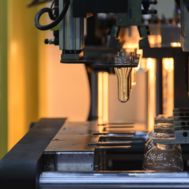
Industries

Applications

Cookie Consent
Cookies are used for statistical purposes and to improve the site.
Cookies will be used after you click "Accept" or if you continue using Dynisco.com
To find out more please review our Privacy Policy.
Fluid dynamics is a subdiscipline of physics concerned with liquid and gas flow. It differs from other branches of fluid mechanics in that it deals with fluids in motion. In physics, a fluid is any substance with zero resistance to shear force. This means any applied stress causes persistent deformation. Two intertwined concepts underlie this behavior: viscosity and intrinsic viscosity. Viscosity serves as a gauge of a fluid's resistance to flow, whereas intrinsic viscosity is a specialized measure that elucidates the flow behavior of polymer solutions, offering valuable insights into the molecular weight and size of the polymer chains. This article will delve into the nuances distinguishing these two concepts with precision and authority.
Viscosity, symbolized as "η", stands as a critical metric of a fluid's resistance to flow, quantifying the internal friction within a fluid and thereby defining its "thickness" or "stickiness". This property is foundational to comprehending fluid behavior, with factors such as temperature, pressure, molecular structure,etc playing significant roles in its determination. Viscosity is quantified in units of pascal-seconds (Pa·s) or poise (P), underscoring its scientific importance.
Intrinsic viscosity is a critical parameter in polymer and protein studies. It relates to the flow behavior of colloidal suspensions. More precisely: intrinsic viscosity refers to the amount of liquid a material can hold per unit weight, and how much that material is contributing to the overall solution’s viscosity. This is a measure of the internal friction within a polymer molecule, and is measured in units of deciliters per gram (dL/g) or milliliters per gram (mL/g). Intrinsic viscosity offers valuable insights into the molecular weight and size & branching of polymer chains.
Understanding the difference between viscosity and intrinsic viscosity is crucial for scientists and researchers working with fluids and polymers. By considering these concepts, they can make informed decisions and predictions about fluid behavior, polymer processing, and material properties.
Viscosity and intrinsic viscosity are related but distinct. The former characterizes a fluid's resistance to flow, while the latter provides insights into flow behavior of polymers in solutions. Both are central to fluid dynamics and polymer science. Studying each of these properties can provide a great depth of insight into various fields of science and engineering.
At Dynisco, we have been developing innovative, high-quality solutions for plastic extrusion processing for over 60 years. Our sensors, controls, and analytical instruments offer better control, reduced downtime, minimum scrap, and unmatched reliability and working life. We are dedicated to collaborating with you to help you measure, analyze, and outfit extrusion control systems that fit your exact needs.
Are you interested in learning more about fluid dynamics and polymer science? Contact us at Dynisco to explore our range of products and solutions tailored to these areas of study. Together, we can drive advancements in science and engineering.
Laboratory Mixing Extruder as Spinning Tool to Fibrillate Droplet Phase of Polymer Blend Systems
Correlation of Melt Viscosity of Polyethylene Terephthalate to Solution Intrinsic Viscosity
Characterizing Thermal Stability of Polymer Melts Using a Capillary Rheometer

38 Forge Parkway,
Franklin MA 02038
+1 508 541 9400
Pfaffenstr. 21, 74078,
Heilbronn, Germany
+49 7131 297 0
Lot 3615, Jalan SM 6/8
32040 Seri Manjung, Perak, Malaysia
+605 6884014